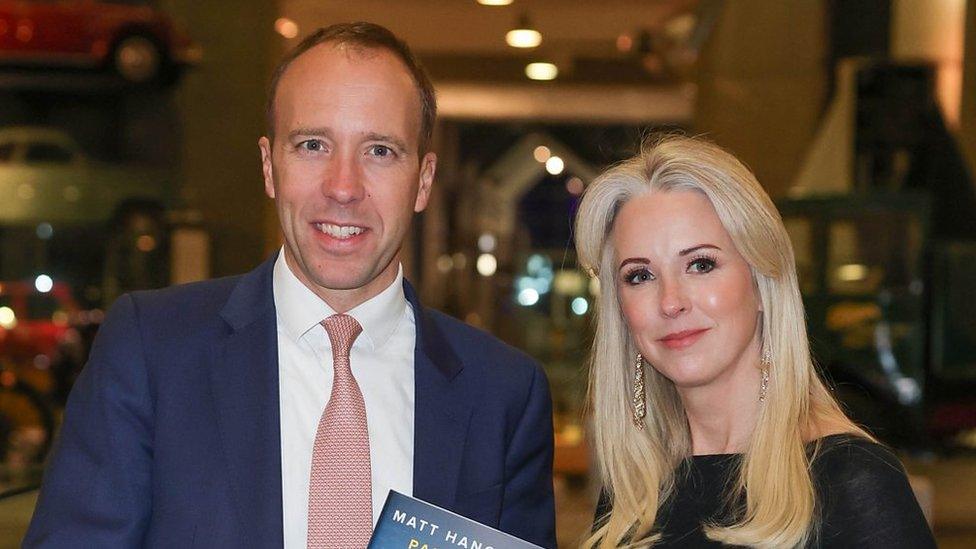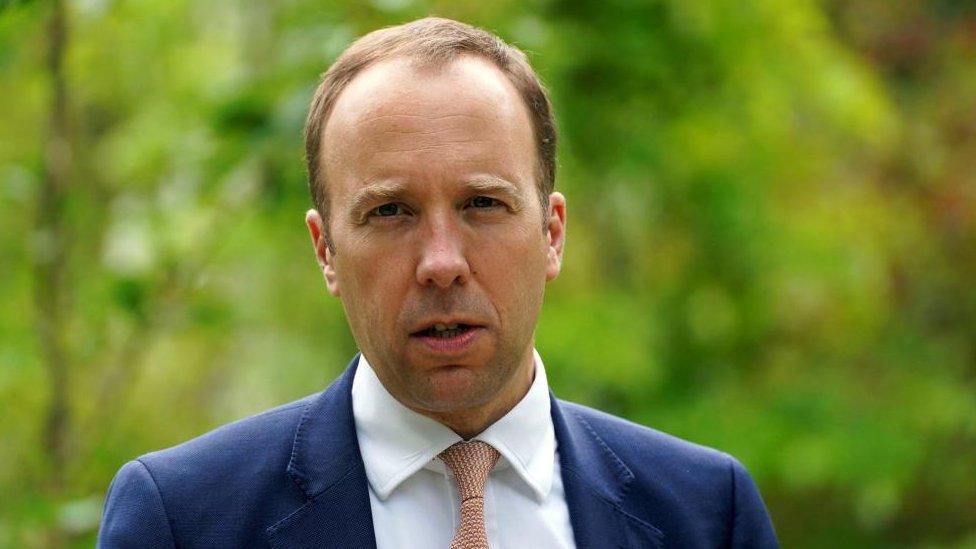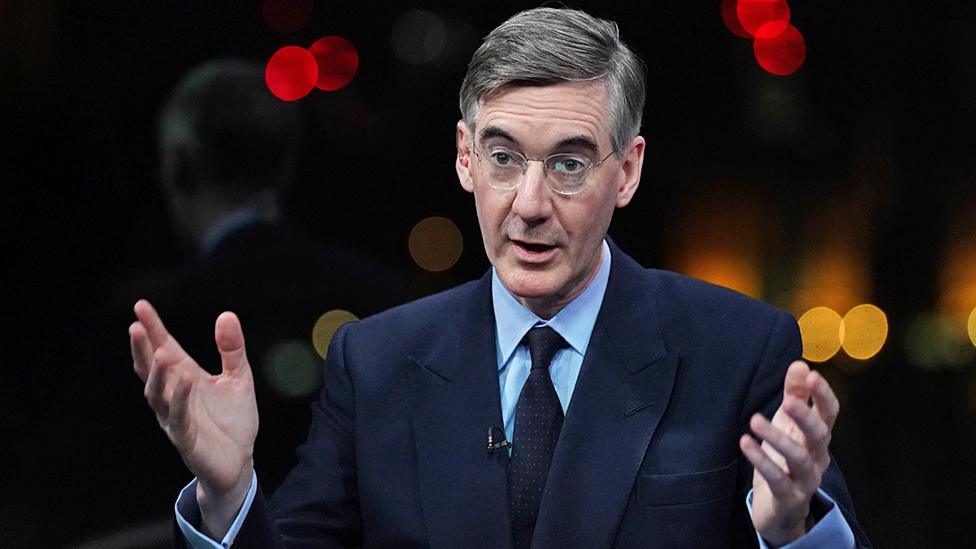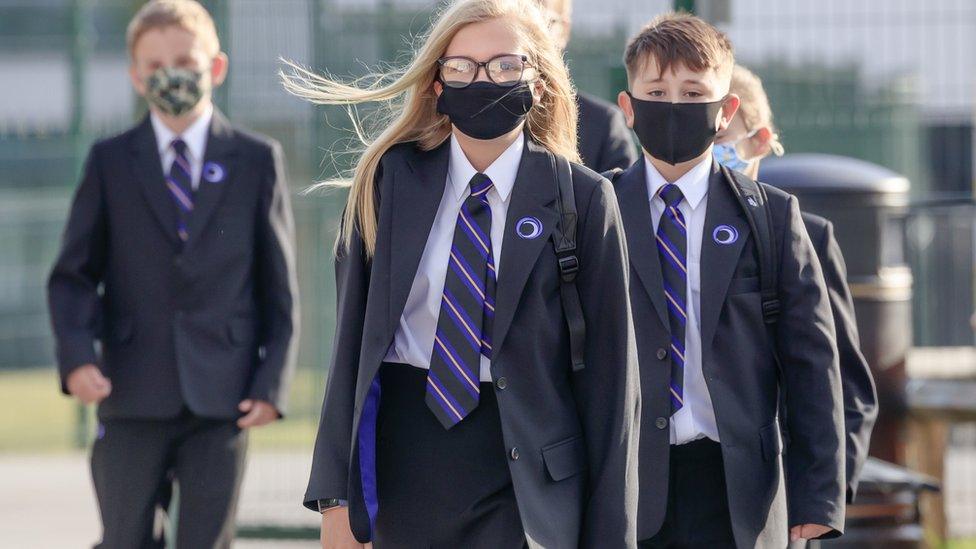Covid messages leak a massive betrayal, says Matt Hancock
- Published

Matt Hancock collaborated with journalist Isabel Oakeshott on his book Pandemic Diaries
Ex-Health Secretary Matt Hancock has accused a journalist of a "massive betrayal and breach of trust" after she leaked texts he sent during Covid.
Isabel Oakeshott defended releasing WhatsApps she obtained when working on Mr Hancock's book, arguing it was in the "overwhelming national interest".
However, Mr Hancock said the messages were released in a "biased account to suit an anti-lockdown agenda".
He also denied her claim he had sent her a "menacing" message over the leak.
The Telegraph has been handed more than 100,000 WhatsApp messages linked to Mr Hancock's time as health secretary at the height of the pandemic. It began publishing the texts earlier this week.
Watch: Isabel Oakeshott reveals why she leaked the messages
In a statement released on Thursday morning Mr Hancock said: "When I heard confused rumours of a publication late on Tuesday night, I called and messaged Isabel to ask her if she had 'any clues' about it, and got no response.
"When I then saw what she'd done, I messaged to say it was 'a big mistake'. Nothing more."
Mr Hancock argued the public inquiry into the pandemic was the right place for analysis of what went on - saying he would reply to the "substance" of allegations at the inquiry.
He apologised to those whose messages had been published by the Daily Telegraph, saying: "I am also sorry for the impact on the very many people - political colleagues, civil servants and friends - who worked hard with me to get through the pandemic and save lives."
"Isabel and I had worked closely together for more than a year on my book, based on legal confidentiality and a process approved by the Cabinet Office. Isabel repeatedly reiterated the importance of trust throughout, and then broke that trust."

The WhatsApp leaks
A collection of more than 100,000 messages sent between former Health Secretary Matt Hancock and other ministers and officials at the height of the Covid-19 pandemic have been obtained by the Telegraph. Here are our stories on the leaks:

The text messages were passed to the newspaper by Ms Oakeshott, TalkTV's international editor, who has been critical of lockdowns. She was given copies of the texts while helping Mr Hancock write his book, Pandemic Diaries.
The BBC has not seen or independently verified the WhatsApp messages nor the context in which they were sent.
Ms Oakeshott has strongly defended her decision to release the messages saying she was someone "acting in the overwhelming national interest". She has not revealed how much she has been paid by the Telegraph.
"Anyone who thinks I did this for money must be utterly insane," she told BBC Radio 4's Today Programme.
"This is about the millions of people, every one of us in this country, that were adversely affected by the catastrophic decision to lockdown the country repeatedly on the flimsiest of evidence, often for the political reasons.
"I wanted to get to the truth of it," she said.
Asked when she told Mr Hancock she would share the messages, she replied: "I didn't tell him."
"Not one journalist worth their salt would sit on a cache of information in such an important matter, such a historic matter and cover that up," she said.
Pressed on the claim that Mr Hancock sent her a menacing message following the leaks, Ms Oakeshott said: "I'm saying that he sent me a message at 01.20 in the morning. It wasn't a pleasant message."
Ms Oakeshott had initially told broadcasters she had signed a non-disclosure agreement (NDA) with Mr Hancock during the writing of her book.
However, she later told the BBC's political editor Chris Mason that there was not an NDA but rather a "really standard terms of agreement between us".
Responding to Mr Hancock's strong criticism, Ms Oakeshott said: "This isn't about embarrassing individuals or making individual politicians look bad.
"It's so much bigger than that, it is about the entire country. And if we're going to talk about betrayal, then the way I see it is the betrayal of every one of us, who were let down by the response to the pandemic."
Asked if she was worried other politicians would stop trusting her with information, she said "No, because I'm really good at what I do. I do stories in the public interest, and I make judgments."

What are non-disclosure agreements?
An NDA is a legal contract between at least two parties that outlines confidential material that they need or want to share with each other, but also want to restrict access to - similar to doctor-patient confidentiality or lawyer-client privilege.
Sometimes known as "gagging orders", "hush agreements" or "confidentiality clauses", NDAs typically prevent people making trade secrets or other specified information public.
They can also apply to allegations of misbehaviour in the workplace after a settlement has been agreed, or anything likely to damage an organisation's reputation.
But like any other contract, they can not be enforced if the specified activities are illegal.
If someone breaches an NDA, they break a contract, leaving them open to being sued.
But there is a public interest defence - the 1998 Public Interest Disclosure Act protects whistleblowers.

The publication of the messages has sent shockwaves through the political establishment as the public inquiry into the pandemic picks up pace.
At Prime Minister's Questions, Rishi Sunak defended the public inquiry as the "right way" to scrutinise the handling of the pandemic and urged people not to focus on "piecemeal bits of information".
PMQs: Rishi Sunak quizzed on claims of leaked Hancock messages by Sir Keir Starmer
Sir Keir Starmer called for Mr Sunak to ensure the inquiry had all the support it needed "to report by the end of this year".
Mr Hancock has already given a partial account of his time as health secretary, with the help of Ms Oakeshott, in his book, Pandemic Diaries.
The book was widely viewed as an attempt by Mr Hancock to rehabilitate his reputation after he resigned as health secretary over breaching social distancing guidance by kissing a colleague.
Last year, Mr Hancock said he would not be standing as an MP at the next general election, after receiving criticism for joining the reality TV show I'm a Celebrity... Get Me Out of Here!
Related topics
- Published1 March 2023

- Published1 March 2023

- Published1 March 2023
